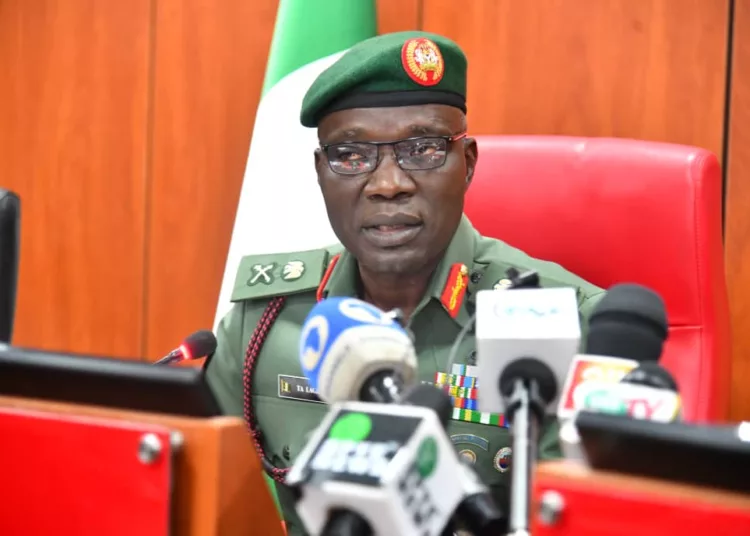Chief of Army Staff (COAS), Lt.-Gen. Taoreed Lagbaja, has said the Armed Forces of Nigeria must attain self-sufficiency in the production of military hardware to be able to meet its operational needs internally.
Lagbaja said this yesterday in a lecture titled, „Role of the Military in the Protection of Nigeria’s National Interest and Security“, at the Maiden Edition of The Chief of Army Staff Annual Lecture Series 2024 of the Nigerian Army Resource Centre in Abuja.
He said the lack of industrial base had turned Nigeria into a mere consumer nation, saying that the Defence Industries Corporation of Nigeria (DICON) Act 2023 would to some extent address the shortcoming.
According to him, the ability of the country to look inward and produce its needed equipment will help the military to be at par with other developed nations of the world.
He said that experts had argued that the international system was anarchical as all the nations pursue their interests at the expense of others.
This, according to him, explains why some of Nigeria‘s strategic partners do not assist nor sell equipment to the country and the armed forces of Nigeria.
“In the past, during the civil war and in the contemporary era when the Boko Haram crisis was at its peak, Nigeria was denied by the US using human rights record, the international humanitarian law and America‘s Adversary through Sanctions act of 2017.
“The Nigeria‘s ability to procure some of the weapons needed was at variance to the interests of the countries involved at that material time.
“While the nation and the armed forces of Nigeria adhered to the specific international standard, the antisocial elements are not and some, like Boko Haram, do not even recognise those enforcing the standards on the armed forces of Nigeria,” he said.
The COAS called for the enhancement of the military‘s effectiveness in internal security operations, containing external aggression and territorial integrity for a safer nation starting with implementation of a whole of society approach.
He said Nigeria‘s National Security Strategy 2019 provided for the adoption of a whole of society approach to security, adding that the concept needed to be refined to suit Nigeria‘s environmental circumstances.
According to him, awareness about it must be given wider and extensive publicity using the Ministry of Information and its agency in order to bring in all segments of Nigeria society to be part of the efforts, thereby ensuring that the citizenry will be ready to assist law enforcement agencies, particularly the armed forces of Nigeria, with information and intelligence.
The minister of defence, Muhammed Badaru, promised to ensure that the nation reaps the full benefit of DICON with the signing of the bill into law.
Badaru called on all Nigerians and the private sector to key into the idea of investing in the military industrial complex as a viable and profitable venture for the benefit of the nation.
He said the security situation had been improving , assuring that President Bola Tinubu would continue to do his best to provide all the necessary equipment and funding needed to fight the war.
He added that there had been significant improvement in funding of armed forces even though not adequate, adding that the nation was progressively moving towards the right direction.
The director-general of NARC, retired Maj.-Gen. Garba Wahab, said the lecture was meant to look at the national issues.
He thanked the army chief for the support to the centre and the minister of defence for his support for the lecture series, assuring that subsequent editions would be open to interaction.
In his remarks, Tajudeen Adeola, a Nigerian businessman and co-founder of Guaranty Trust Bank, who chaired the session, said the purpose of government was to improve the standard of living of the citizens.
Adeola said the military, saddled with the responsibility of defending the territorial integrity of the country had continued to keep the country safe and secure.











